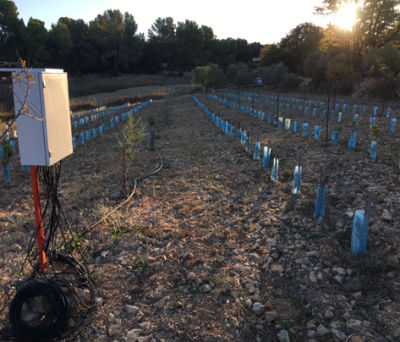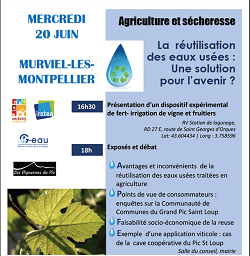National Research Institute of Science and Technology for Agriculture and Environment.
Irstea is a research organization which, since more than 30 years, works on major issues of a responsible agriculture and territories sustainable planning, water management and related risks, drought, floods, inundations, the biodiversity and complex ecosystems study in their interrelation with human activities.
Multidisciplinary research, appraisal and support to "agri-environmental" public policies ", partnership with territorial authorities and actors of the economic world, such are the characteristics of Irstea, qualified "Carnot Institute". In the continuity of the research model of Cemagref, every day our engineers and our researchers put a lot of themselves into their mission : to take up the challenge of global change comprehension for a sustainable and environmentally friendly development.
The environmental research
The environment sciences embrace the study of natural environments and resources, biodiversity and ecosystems, and more generally, dialectically, of the impact of human activities on the environment as well as the one of global change on man and his environment.
The "environmental shock" noticed by Kyoto protocol, raises complex and multisclale challenges for the planet. The research questions facing economic and societal challenges related to climate change and the invention of ecological growth patterns (or "green growth"), whether it's energy efficiency, renewable energy, to access to water resources, food production, risk management and restoration of natural environments.
Serving a national strategy
Since the process of the Grenelle Environment, France is engaged in a major dynamic of "ecological transition" of the economy and society. The National Strategy for Sustainable Development (NSSD) 2009-2013, the ministry in charge of Ecology, sets out nine objectives for the adaptation to global change. The objective Earth 2020 of Ministry of Agriculture expresses the necessity to conciliate our production process with ecological efficiency. Formulated in autumn 2008, the concept of "green growth" is based on the virtuous circle of economic competitiveness predicated on the environment and ecosystems respect in a logic of sustainable economic performance. It is expected that this new form of growth generates thousands of "green" jobs in all industries.
Research and technological innovation for the environment are at the forefront of this process of ecological transition. They are among the five scientific priorities selected in 2009 within the "National Strategy for Research and Innovation" (SNRI).
Interdisciplinarity
The "environmental research" covers a very wide scientific field by the diversity and complexity of the studied systems, the understanding of phenomena that characterize them, the development of scientific issues arising. It therefore asks first to mobilize the full range of disciplines and scientific and technological skills, from exact and experimental sciences to social sciences and humanities. Environmental research is inherently multidisciplinary.
Targeted research
Face to environmental issues, policy makers, economic and societal actors are conducted to better understand the evolution and the mechanisms involved to implement innovative and adapted solutions. So, they need to have scientific knowledge that lead to results or operational solutions, whether in the form of expertise or innovation.






